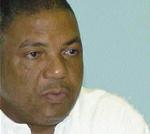
Dalley
Gareth Manning, Sunday Gleaner Reporter
Sections of Kingston, St. Andrew and St. Catherine have been put on an official alert following the confirmation of four more cases of malaria and 23 other suspected cases. At least two children have been hospitalised, officials say. This brings to eight the number of confirmed cases. Four others were identified in Kingston, St. Andrew and St. Catherine recently.
The areas being closely scrutinised by the Ministry of Health include all communities in Kingston 13, Kingston 12, Kingston 14 and Sydenham in St. Catherine.
Speaking with The Sunday Gleaner yesterday, Minister of Health Horace Dalley said the ministry has intensified its efforts to contain the disease following the confirmation of the new cases and further disclosure that the disease is being caused by the deadliest type of malarial parasite, the Plasmodium falciparum.
"No amount of money will be spared. No effort will be spared. We want the country to know that every single thing will be done," Mr. Dalley said.
emergency health teams deployed
All the nation's points of entry and exit, including the two main airports, have been searched thoroughly by health teams and airport officials asked to monitor people travelling from particular countries. Meanwhile, emergency meetings are to be called in some communities, such as Sydenham, and
more emergency health teams are to be deployed to affected areas.
Two experts from the Pan American Health Organisation are also expected to arrive in the island to assist in control and containment of the disease. The Health Minister has also sought the help of the Ministry of National Security, Opposition Spokesman on Health, Dr. Ken Baugh, and Kingston Mayor, Desmond McKenzie, to provide support.
It is still not clear if the disease was imported, but Mr. Dalley said investigations so far are pointing to an importation of the virus.
At least two of the persons confirmed with the disease are from Kingston 12 and 13 addresses, and are known to travel overseas frequently. The first confirmed case, a 72-year-old woman of the Maxfield Park and Delacree Park areas, was known to frequently travel to New Jersey and Los Angeles. She also visited communities in the vicinity of Spanish Town Road, Sydenham in St. Catherine, and communities in Clarendon.
The second confirmed person was also known to travel frequently to Santo Domingo in the Dominican Republic. She is employed as a domestic helper in Sydenham.
Mr. Dalley says there were also a number of Haitians living in the Kingston 12, 13 and 14 communities. Haiti has some 10,000 people infected with malaria and is ranked 73rd on the World Health Organisation's list of most infected countries.
He says fishermen in those communities were also known to mingle with Nicaraguans and other people from Latin American countries.
Intensify investigations
"The reports have caused us to intensify our investigations and I want to call on the citizens of [affected] areas to cooperate with health teams and protect themselves," Dalley says.
The ministry has so far visited 333 communities in Kingston St. Andrew, St. Catherine and Clarendon, and have collected 148 samples from people showing symptoms of the disease over the past three days.
In a press statement yesterday, Opposition Leader Bruce Golding called for the immediate establishment of command centres for the testing of persons feeling the symptoms of malaria. Golding, who is the Member of Parliament for West Kingston, has asked the health authorities to urgently "undertake an intensive programme of vector-control spraying throughout the area".
Differential diagnoses
Meanwhile, president of the Medical Association of Jamaica, Dr. Alverston Bailey, is asking local doctors to take the alert seriously. He is advising them to include the disease in their differential diagnoses of all fever syndromes and to test patients who have a fever. Dr. Bailey says the disease should be diagnosed early so immediate and aggressive treatment can begin to prevent complications. He adds that doctors should report all suspicious and confirmed cases without delay to the Ministry of Health.
Malaria is an infectious disease that is widespread in tropical and subtropical regions of the world. It is caused from a group parasite known as plasmodia that infects the body's red blood cells. The female Anopheles mosquito transmits the parasite. Treatment is available for the disease, but there is no vaccine.
The disease infects between 300 million and 500 million yearly, and kills between one million and three million people. Most victims are children in sub-Saharan Africa, but there are also thousands of infected people in parts of the Caribbean and Latin America, particularly Venezuela, Guatemala and Guyana, where a combined total of over 90,000 people have the disease. They are the highest-ranked Latin American and Caribbean countries on the World Health Organisation (WHO) list of most infected countries, ranking 56th, 57th and 58th, respectively. The closest infected country to Jamaica is Haiti.
Symptoms of the disease are usually flu-like, the Ministry of Health says, and can arise within six to 14 days of infection. They include fever, headaches, chills, muscle aches and fatigue. Severe cases of the disease can progress rapidly and cause death within hours or days.
People are also being advised to visit their local hospitals.

